There’s nothing quite as disruptive as a sudden toothache. It creeps in at the worst times, late at night, during work, or even on weekends, and can quickly go from uncomfortable to unbearable. While some dental issues can be delayed, tooth pain often signals an urgent problem that requires immediate care. That’s when seeing an emergency dentist makes all the difference.
This article walks you through what emergency dentists do, how they relieve pain fast, and why early treatment matters more than you might think.
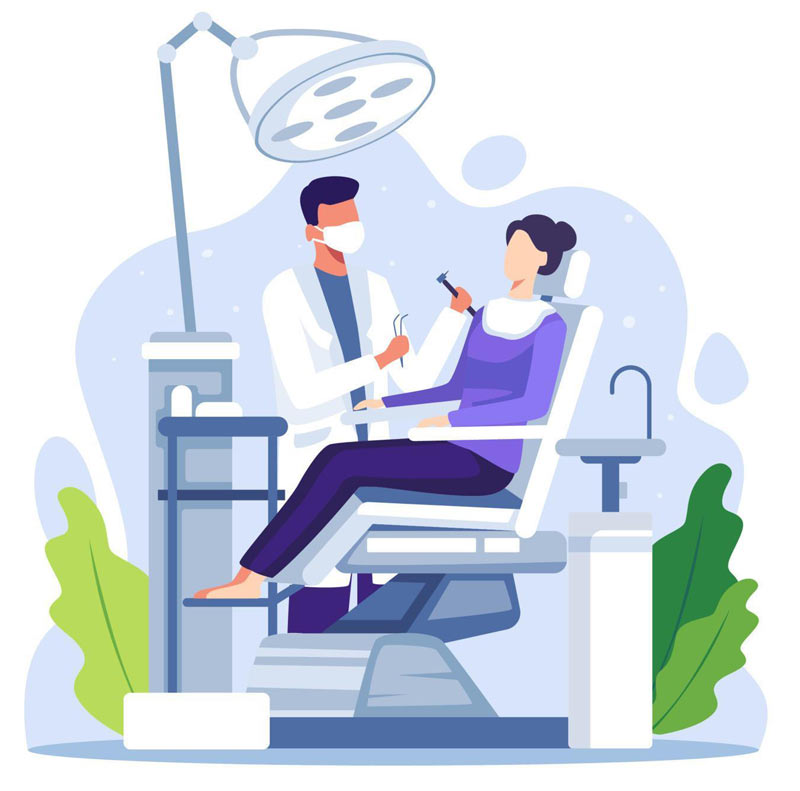
What Is a Toothache?
A toothache is more than just a mild discomfort; it’s your body’s alarm bell, telling you something is wrong with your tooth or the tissues around it. While some aches come and go, persistent pain usually points to a deeper issue like a cavity, infection, or trauma. Ignoring it won’t make it disappear; it’ll likely get worse.
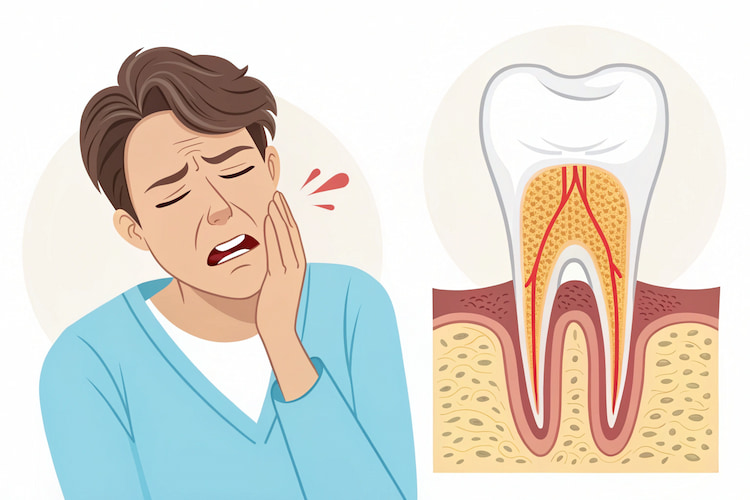
What Causes a Toothache?
A toothache can happen for many reasons. Here are the most common causes:
- Tooth decay: Cavities form when enamel breaks down, exposing sensitive nerves inside the tooth.
- Gum disease: Infections in the gums, especially if they reach below the gumline, can lead to persistent pain.
- Cracked or broken tooth: Even small fractures may cause sharp pain when biting or chewing.
- Food lodged between teeth: Trapped food particles can irritate the gums and nearby nerves, mimicking the feeling of a toothache.
- Dental abscess: A severe infection at the root of the tooth can cause swelling, fever, and intense, throbbing pain.
Whatever the cause, a toothache shouldn’t be brushed off. An emergency dentist can quickly pinpoint what’s wrong and start the right treatment.
For tips on natural ways to ease tooth pain at home, check out this helpful guide from Healthline.
How Emergency Dentists Treat Toothaches
Emergency dentists specialize in handling sudden pain and dental crises. Their goal is to relieve discomfort fast, stop the problem from getting worse, and restore your comfort.
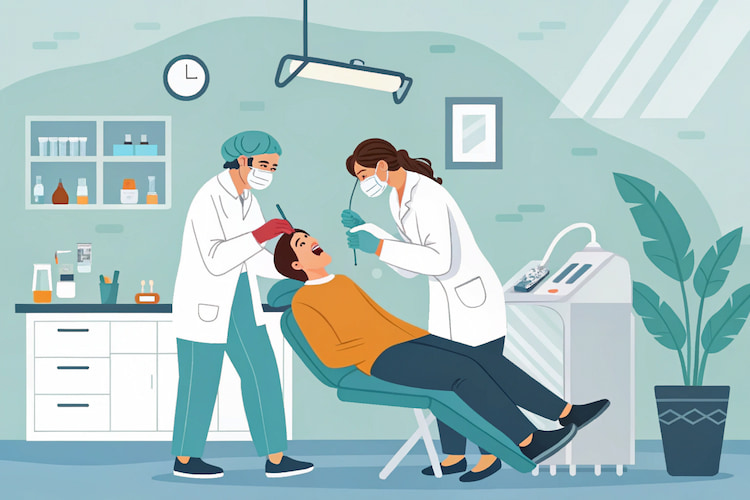
Diagnostic Methods
Your visit usually starts with a quick evaluation. The dentist will ask about your symptoms, pain level, and any recent incidents like biting hard food or trauma. They may use digital X-rays to look for hidden decay, abscesses, or cracked roots. A visual exam and gentle pressure tests help locate the exact source of the pain.
Common Treatment Options
Once the problem is identified, the dentist will suggest a treatment based on how serious it is.
| Issue | Treatment Option | Purpose |
|---|---|---|
| Deep cavity | Filling (temporary or permanent) | Restores the tooth and stops decay |
| Infection inside the tooth | Root canal or antibiotics | Removes infection and saves the tooth |
| Severe damage or a cracked tooth | Tooth extraction | Prevents further pain or infection |
| Swollen gums or a minor infection | Medication and dental cleaning | Reduces inflammation and bacteria |
Pain Relief Techniques
Emergency dentists are prepared to provide fast pain relief during your visit. Emergency dentists use several effective methods to relieve your pain quickly:
- Topical numbing gels to ease surface pain before treatment begins.
- Local anesthesia to block pain completely during procedures.
- Prescription painkillers to help manage discomfort after the visit.
- Antibiotics if there’s an infection causing or worsening the pain.
In most cases, you’ll leave the clinic feeling much better than when you walked in.
Benefits of Emergency Dental Care
When a toothache hits hard, waiting isn’t always an option. Seeing an emergency dentist as soon as possible offers more than just fast pain relief; it protects your oral and overall health in ways you might not expect. Let’s look at why immediate care is so valuable.
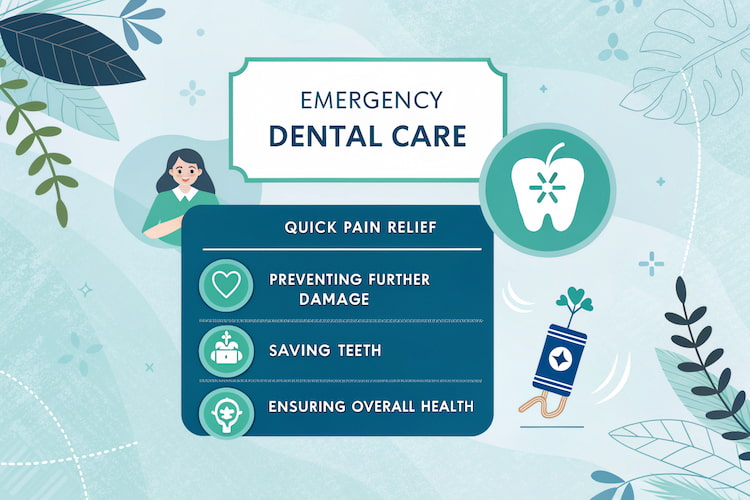
Immediate Pain Relief
You don’t have to suffer through the day (or night). Emergency dentists are trained to quickly diagnose and treat the source of pain so you can feel better, often within a single visit.
Preventing Further Damage
Ignoring a small dental issue can allow it to grow into a major one. Early treatment stops decay or infection before it spreads to nearby teeth, your gums, or even your jawbone.
Convenient Access to Care
Emergency dental clinics understand that pain doesn’t follow a schedule. Many offer extended hours, walk-in availability, and same-day appointments to get you the help you need, when you need it.
Avoiding Complications
The longer you delay care, the more complex (and costly) the treatment can become. Acting quickly lowers the risk of needing surgery, extractions, or facing medical emergencies like systemic infection.
Risks of Delaying Emergency Treatment
Many people hope a toothache will just go away, but the truth is, dental issues usually get worse, not better. Putting off treatment may feel easier in the short term, but it often leads to far more serious consequences.
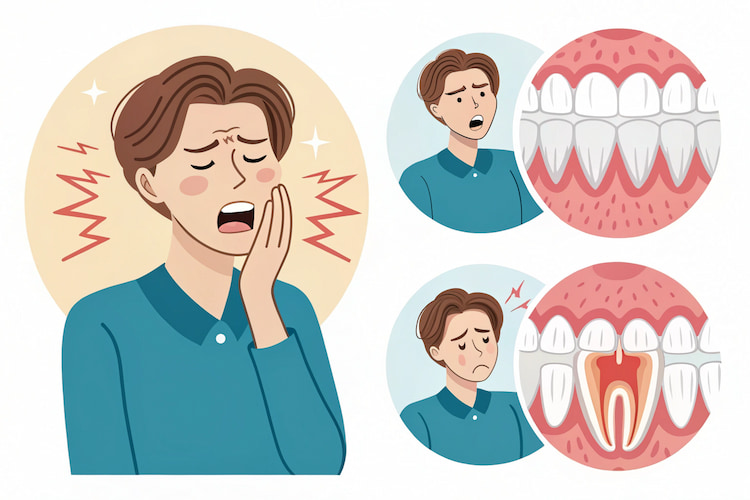
Worsening Pain
What starts as mild discomfort can quickly turn into sharp, constant, or throbbing pain that makes it hard to sleep, concentrate, or enjoy your meals. Pain is your body’s way of sounding the alarm.
Infection Spread
If an infection is left untreated, it can travel to nearby teeth, your jawbone, or even into your bloodstream, a medical emergency known as sepsis. That’s why fast treatment isn’t just about comfort, it’s about protecting your health.
Who Should Seek Emergency Dental Care?
Tooth pain isn’t always a full-blown emergency, but certain symptoms are red flags that shouldn’t be ignored. Knowing when to call an emergency dentist can save your tooth and protect your health.
Talk to a Local Professional
The experienced team at My Dentist Langly is here to help with same-day emergency appointments, compassionate care, and personalized treatment plans.
Symptoms Requiring Urgent Care
| What’s Happening | Go to an Emergency Dentist? | Why |
|---|---|---|
| A Bad toothache that won’t stop | ✅ Yes | It could be a serious issue, like an infection. |
| Swelling in your face or gums | ✅ Yes | It might be a spreading infection. |
| Bleeding that won’t stop | ✅ Yes | Could mean injury or gum problems. |
| It could mean injury or gum problems. | ✅ Yes | Acting fast may save the tooth. |
| Fever, pus, or bad taste in the mouth | ✅ Yes | Signs of infection that need treatment. |
| Mild pain once in a while | ❌ Not always | Can wait, but watch for changes. |
| No swelling, bleeding, or fever | ❌ Not right away | Book a regular checkup if it continues. |
When to Wait for Regular Appointments
Mild, manageable toothaches without swelling or severe discomfort may be okay to monitor briefly, especially if they improve with flossing or over-the-counter pain relief. Still, any change in intensity, color, or gum condition means it’s time to get checked out.
Cost and Accessibility of Emergency Dental Care
One concern people have is the cost of emergency dental visits. While prices vary depending on the treatment and clinic, many practices aim to make emergency care accessible.
You’ll often find clinics that accept dental insurance, offer flexible payment plans, or provide transparent pricing upfront. The long-term benefit of treating a problem early almost always outweighs the cost of letting it grow into something more serious.
Sum Up
Toothaches are more than a nuisance; they’re a signal that something needs attention. Whether it’s a simple cavity or a serious infection, an emergency dentist can relieve your pain quickly and prevent long-term damage. Don’t wait for things to get worse. Taking action now can save your tooth, your wallet, and your peace of mind.
FAQs
-
What causes a toothache?
Toothaches can be caused by cavities, infections, cracks, gum disease, or trauma. An emergency dentist can identify the cause quickly.
-
When should I see an emergency dentist?
Seek care if the pain is intense, persistent, or accompanied by swelling, bleeding, or signs of infection.
-
What treatments can an emergency dentist provide?
They may perform root canals, extractions, fillings, or prescribe antibiotics and pain relievers depending on the situation.
-
How can I manage toothache pain at home?
Use cold compresses, rinse with saltwater, and take over-the-counter pain medicine—but always follow up with a dental visit.
Have you ever had to visit an emergency dentist?
Drop your experience, thoughts, or questions in the comment box below. We’d love to hear from you!




